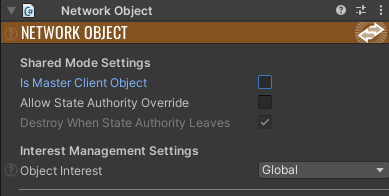Shared Mode Master Client
Overview
The SharedModeMasterClient is role given to one client in a Shared Mode session. A player with this role will have a few unique privileges that other clients will not have access to.
Assignment
By default, the role of SharedModeMasterClient will be assigned to the player who created a Shared Mode session. Players can determine if they are the SharedModeMasterClient by simply calling NetworkRunner.IsSharedModeMasterClient. This role will be reassigned if...
- The
SharedModeMasterClientleaves or is disconnected; a newSharedModeMasterClientwill be automatically assigned to one of the clients currently in the room. - The
SharedModeMasterClientexecutesNetworkRunner.SetMasterClient(PlayerRef player)
SharedModeMasterClient Privileges
As previously mentioned, the SharedModeMasterClient has a few unique privileges.
Scene Management
In Shared Mode, only the SharedModeMasterClient has the authority to manage scenes; this includes any method involved with scene management such as NetworkRunner.LoadScene.
Initial State Authority over Scene Objects
When a new scene is loaded, the SharedModeMasterClient will have StateAuthority over all NetworkObjects baked into the scene.
Is Master Client Object
In the Shared Mode Settings for NetworkObjects, if Is Master Client is set to true, the SharedModeMasterClient will always have State Authority over this NetworkObject. If a new SharedModeMasterClient is assigned, the State Authority for this NetworkObject will transfer to the new SharedModeMasterClient.
Despawning Objects With No State Authority
If a NetworkObject has Allow State Authority Override checked and Destroy When State Authority Leaves unchecked in its Shared Mode Settings, the NetworkObject will not be destroyed if the player disconnects; however, the SharedModeMasterClient can despawn this object despite not having StateAuthority over it.

Tracking the Shared Mode Master Client
NetworkRunner.IsSharedModeMasterClient will tell the user if they are the SharedModeMasterClient but there is no built-in solution for letting other clients know who the SharedModeMasterClient is. This can sometimes be useful in applications where letting the other players know who the SharedModeMasterClient in a session is. The following is one way this can be achieved:
- Create a
NetworkObjectand setIs Master Client Objectto true under theShared Mode Settings. - Create a script like the following that can be used to send who the
SharedModeMasterClientis and add it to the previously createdNetworkObject:
using Fusion;
public class SharedModeMasterClientTracker : NetworkBehaviour
{
static SharedModeMasterClientTracker LocalInstance;
public override void Spawned()
{
LocalInstance = this;
}
private void OnDestroy()
{
if (LocalInstance == this)
LocalInstance = null;
}
public static bool IsPlayerSharedModeMasterClient(PlayerRef player)
{
if (LocalInstance == null)
return false;
return LocalInstance.Object.StateAuthority == player;
}
public static PlayerRef? GetSharedModeMasterClientPlayerRef()
{
if (LocalInstance == null)
return null;
return LocalInstance.Object.StateAuthority;
}
}
By storing a static instance of this NetworkBehaviour, users can then check to see which player is the SharedModeMasterClient and respond accordingly.